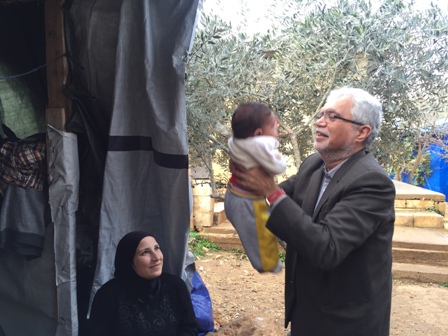Board Vice Chair Mukesh Kapila Visits NP in Lebanon

It was inspiring to see how refugees are coping under difficult conditions - now winter there - by helping each other; the experienced Palestinians are teaching the new Syrian refugees “how to live as a nation without a country.” I am still digesting what I learnt and relating this to the wider debate on migration and protection of civilians caught up in armed conflicts, as well as the chicken-and-egg links between peace and humanitarian action.
One highlight of my visit was, of course, to call upon the NP assessment team in Beirut. I was pleased to meet the team and enthused by their plans and hopes. They are getting registered as a branch, putting down roots, and taking time to understand the complexities of the region and build relationships before jumping into implementation. There are many pitfalls for the unwary and so this is careful work, there are many challenges in the region so new models have to be invented through trial and error. The point here is that although NP has a doctrine and a methodology and can clone experiences from South Sudan and elsewhere, it must adapt its approaches according to context and not just replicate a template.
NP is building partnerships with civilians and local organizations, working to learn what would be effective programming. A long term approach will be needed in this region and that means long term investment and patience before results are visible (apart from the challenge of defining those results). I am sure we have done the right thing to open up programming there but hope that donors will stay the course. This means finding some more sustainable funding models – easier said than done.
I would also like to take this opportunity to acknowledge all the hard work done by Mel Duncan to set up the program, Doris who visited and the team who worked hard to persuade EU to give the multiyear grant that got NP there.

